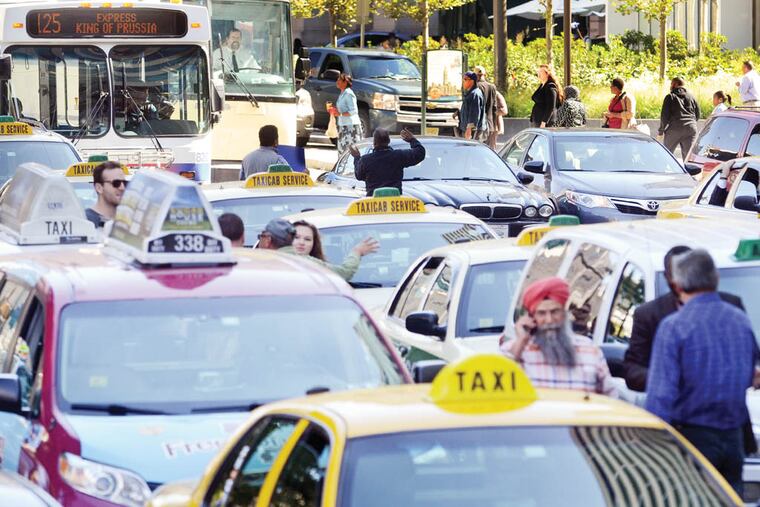No bidders for $475K taxi medallions
With Philadelphia taxi service facing an uncertain future, no one was willing to bid Wednesday on new taxi medallions offered for sale by the Philadelphia Parking Authority.

With Philadelphia taxi service facing an uncertain future, no one was willing to bid Wednesday on new taxi medallions offered for sale by the Philadelphia Parking Authority.
The PPA had set a minimum bid of $475,000 for each of the two medallions, based on recent private transactions of more than $500,000.
The new medallions are the first of 46 being offered for sale this year by the PPA, and all must be used on new wheelchair-accessible vehicles, in an effort to increase the availability of taxis to wheelchair users.
Wednesday's auction, the first ever by the PPA, came amid statewide debate over the efforts of "ride-share" companies like Uber and Lyft to enter the Pennsylvania market.
The San Francisco-based ride-share companies connect people looking for a ride with private car owners looking for extra money. Their phone apps allow riders to summon a car, pay for the service, and get a receipt, all electronically.
In Philadelphia, the PPA regulates taxis, and owners must have a medallion to operate. In the rest of the state, where medallions are not involved, the Pennsylvania Public Utility Commission regulates the industry.
Dennis Weldon, general counsel for the PPA, said the prospect of competition from Uber and Lyft might have made bidders reluctant to meet the asking price, for fear the medallions' value would fall.
Medallions have skyrocketed in value in recent years, going for as much as $545,000 earlier this year, up from $65,000 in 2005.
"If people get a little anxious about Uber and Lyft coming into the market, they might not bid," Weldon said. "That's why we asked the legislature to exempt Philadelphia" from any legislation creating new rules for ride-share operators.
But Weldon said other factors were also at work, including recent efforts by one cab company, Freedom, to block all private sales of medallions. The PPA must approve all private transactions.
The PPA board in August rejected Freedom's objections to about 25 private medallion sales.
"Because of the protests filed, there may have been some uncertainty on the part of lenders on the true value of the medallions," Weldon said.
"We're thinking we're going to get some more bids next week," when three more medallions will be offered for sale, again with a $475,000 minimum.
Auctions will be held almost weekly through the end of the year, in an effort to sell the 46 new medallions.
Ronald Blount, president of the Taxi Workers Alliance of Pennsylvania, which represents 1,200 cabdrivers, said the lack of bids could be blamed on "collusion by companies that want the PPA to sell the medallions at a cheaper price."
"Maybe the PPA has to lower the asking price or come up with another strategy, like leasing medallions to drivers for $400 or $500 a week."
Alex Friedman, general manager of the All City and Checker Cab companies, which dispatch about 750 of Philadelphia's 1,600 taxis, said there was no collusion among owners.
He declined to speculate on why there were no takers for the new medallions Wednesday.
If the PPA becomes convinced the minimum bid is too high, it is required to provide 60 days' notice before making any changes.
"One week is just too short a period of time to make any kind of change," Weldon said.
The two medallions that went begging Wednesday will be reoffered for sale on Jan. 21.